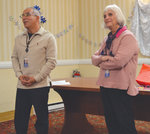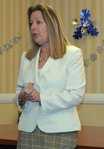

Cherry Hill Manor used a unique concept to spread awareness about how crisis situations can change lives in an instant.
The rehabilitation center played host to the Upside Down Dinner on Jan. 14, which featured a menu that started with dessert, followed by a chicken francaise entree and then salad. More than a couple dozen attendees listened intently to CareBreaks respite coordinator Hector Munoz, volunteer Paula Dunne and O’Hara Senior Care Services owner Brendalee O’Hara.
According to the CareBreaks information page on the Paying for Senior Care website, the program is aimed at providing “unpaid primary caregivers of physically disabled individuals, those with Alzheimer’s disease or a related dementia, and frail seniors a break (respite) from caring for their loved one.” CareBreaks is administered by the Roman Catholic Diocese of Providence, with funding from the Rhode Island Office of Healthy Aging.
“Being a primary caregiver can be a taxing and stressful responsibility that allows little time to care for oneself,” the website reads. “Respite care allows the caregiver free time to use as they choose, from running errands to going to a hair or doctor’s appointment to simply relaxing.”
O’Hara has worked closely with Munoz for more than 15 years, and she lauded Cherry Hill Manor director of business development Julie Fox for the “brilliant marketing” of the dinner.
“I deal with so many families, you guys, that their lives are upside down. It’s a crisis situation and I’m going to tell you a quick story,” O’Hara said. “I’m going to be real honest – I don’t want to take care of my mother. I don’t want to shower her. I don’t want to cook for her and I don’t want to change her bed. Call me whatever you want. I want to be her daughter. That’s what I want to be. I want Gemma, who comes in, through another agency through the state, every day, Monday through Friday, to come in and help her make sure she’s taking her pills, she’s getting dressed.”
O’Hara referenced a story from the week before, when she received a “frantic message” from a woman who said her father had been displaying “outrageous behavior” since her mother passed away a few days prior.
She said it took 10 minutes to calm the woman down once they connected over the phone, after which she said she couldn’t figure out why her father couldn’t function.
“She guided him every second of the day,” O’Hara said of the man’s wife. “They knew there were some things and some forgetfulness, but not to the level that when the mother died, the man can’t even write a check. He can’t sit and write a check without somebody sitting down and saying, ‘OK, dad, write the check to this person for that much.’ … this man is incapable of doing without his wife who just passed away. They’d been married for 48 years. He just lost his biggest supporter.”
She said the man’s behavior wasn’t unusual given he had just lost his wife, and that it can be difficult to catch any red flags along the way without keeping a more watchful eye.
“So throw in the caveat of, ‘Oh, my God, I had no idea’ – well, of course you had no idea, because if you call and for 15 minutes on the phone they can get by and pull the wool over your eyes, and you go visit once a week for an hour, she’s chiming in like he can’t remember what to say, so you don't really catch those things,” O’Hara said.
O’Hara heaped praise on Munoz’s CareBreaks program, saying she is thankful for the service he provides to people who don’t have $25 an hour to pay for help. Sometimes, asking for that assistance can be a matter of life or death.
O’Hara called back to another interaction she had with a man in his mid-90s, who was on little to no medication and golfed every day, but was “deaf as a doornail” with exceptionally poor short-term memory.
Despite those limitations, he would still drive to his son’s home in South Carolina.
“I said it to the son. I said, ‘How dare you don't take that car away from him,’” O’Hara said. “It’s not if something happens, it’s when something happens. It’s when something happens.”
O’Hara emphasized her company’s dedication to meeting the needs of adult children and their parents, ensuring they take their medications properly and that they’re eating right. She also offered a piece of advice for elderly folks to follow regarding their age.
“Respect the number,” O’Hara said. “One fall down those stairs. Stairs are your enemy, people. Stairs are your enemy. You better believe it. If you break something, you’re not going home. You’re coming here for a while, rehabbing, then you’re going home and you’re not getting back to where you were. If you're 75 and above, whatever you broke, you’re not getting back to where you were. You’re not getting back the range of motion you had.”
Comments
No comments on this item Please log in to comment by clicking here